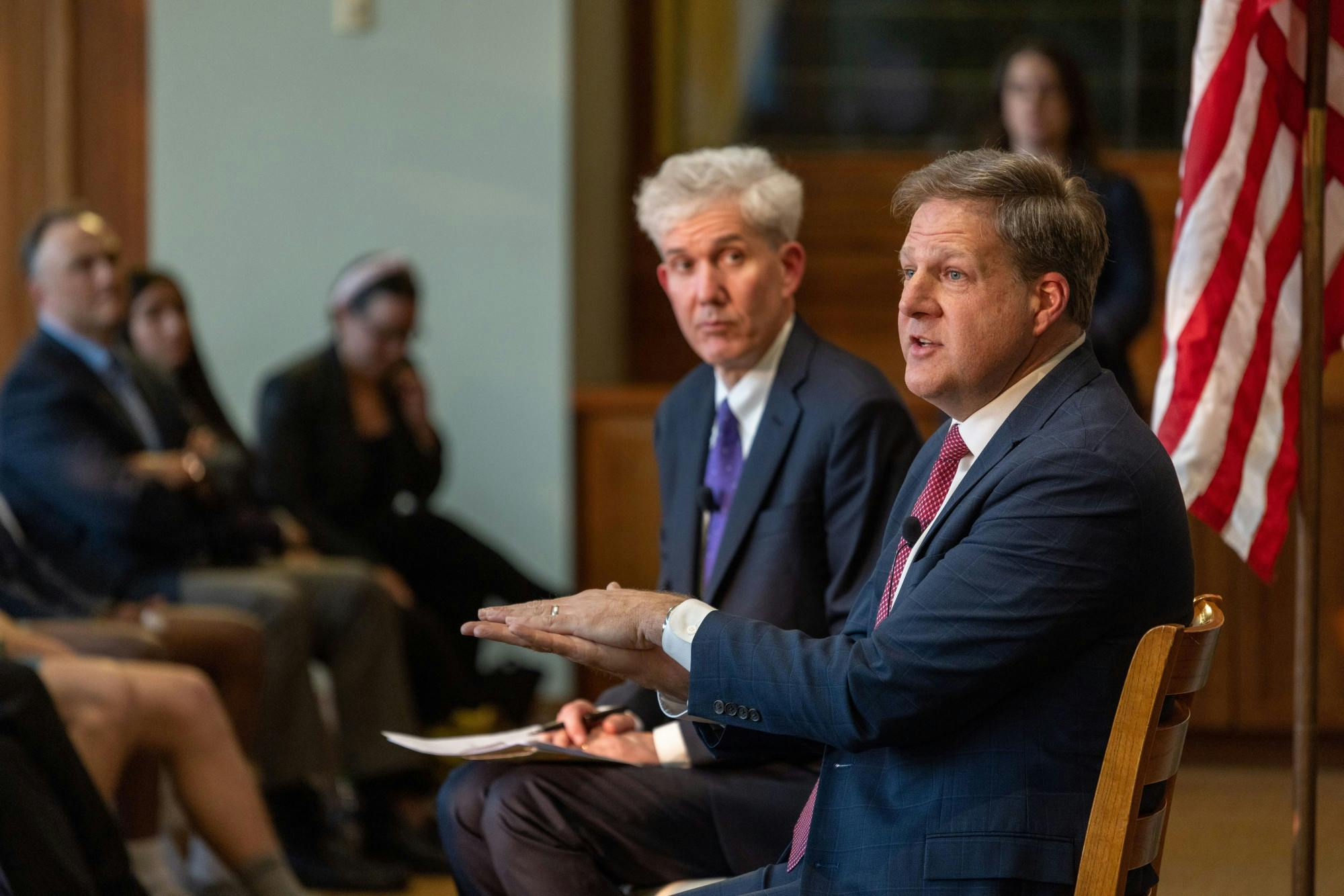On May 8, the Tuck School of Business hosted Gov. Chris Sununu, R-N.H., for its View from the Top speaker series. Sununu spoke about his experiences in public service and fielded questions — both from moderator Dean Matthew Slaughter and audience members — about potentially running for president in 2024.
While Sununu said he was neither ruling out nor “really thinking about” seeking a fifth term as governor, he said that a role in Washington D.C. is “on the table, very much.” Sununu previously stated in April he will make a decision about a White House bid this summer, according to New Hampshire Public Radio.
The hour-long event, which was co-sponsored by the Center for Business, Government and Society at Tuck, the Nelson A. Rockefeller Center’s Brooks Family Lecture Series and the Tuck Business and Politics Club, was attended in-person by 267 community members, with another 70 viewers joining via Zoom, according to visiting executive program manager Alison Greene.
In an opening conversation with Slaughter, Sununu spoke about leading the Granite State and the experiences which drew him to the Governor’s Mansion. Sununu said his interest in government stemmed from his parents, who instilled in him the importance of community service. Sununu’s father, John Sununu, served as governor of New Hampshire from 1983 to 1989, and as White House Chief of Staff to President George H.W. Bush from 1989 to 1991.
Sununu emphasized that working in the private sector as a corporate executive before entering politics taught him lessons he has used in public office.
“All these skills that you learn in the private sector all translate, I think, to better leadership,” Sununu said. “Not that you have to run a business, per se. Be at a non-profit, do something, get out in the world so that when you do commit yourself [to] public service or whatever it might be, you give 120%.”
Asked to reflect on his accomplishments in office, Sununu said he was most proud of his administration’s pandemic response, citing “the team and the people that understood what had to be done,” which he assembled. In terms of areas of improvement, Sununu said he hoped to inspire more bipartisanship in the legislative process.
In the latter part of the conversation, Slaughter focused on Sununu’s hypothetical presidential bid. Sununu discussed former President Donald Trump, who is widely seen as the frontrunner for the 2024 Republican presidential nomination, asking the audience, “Why should you favor me over Trump, really?”
“It’s really simple,” Sununu said. “If you elect somebody, you vote for somebody, it has to be because they can win and get something done — that’s it. We should always vote for the most conservative candidate that aligns with our ideals and can win in November and get stuff done in 2025.”
Although Sununu said he supported Trump in both 2016 and 2020, adding that he would support Trump again if the former president wins the GOP nomination next year, he argued that Trump failed to secure “easy wins for Republicans with Republicans” during his time in office.
“And he had Republicans, by the way, in the House and the Senate,” Sununu said. “He said he was going to secure the border. He didn’t do it. He said he was going to be fiscally responsible and $8 trillion more into the debt. That didn’t happen either.”
Sununu pitched his potential candidacy on the idea that both he and the government “are not here to solve … problems” but rather to “create as many doors of opportunity” for constituents. Operating under a “live free or die” mentality, Sununu said he wants the government to spur individual development and local community involvement.
A self-described “fiscal hawk,” Sununu added if he were to become president, top priorities would include balancing the federal budget, decentralizing the federal government and empowering state governments to take more control of the legislative process. Sununu added the welfare system needs redesigning to protect seniors from future cuts to their benefits.
“I’m thinking, ‘what are we going to get out of this five, 10 or 20 years down the road,’ in terms of the state of New Hampshire,” Sununu said. “And I think that if you bring that mentality into Washington, D.C., you’re going to get far better results.”
After the conversation, Sununu answered questions from audience members in a Q&A segment, followed by five minutes of closing remarks. During the Q&A, Sununu engaged with a number of political issues, including climate change, gun control, immigration, healthcare and the recent failure of Silicon Valley Bank. Sununu answered the final audience question with a call for bipartisan understanding.
“We can have it out, but it doesn’t mean we’re personally opposed,” Sununu said. “It means we’re passionate about our issues, and there’s nothing wrong with that.”
Alex Lawson ’23, who attended the event, said it was “an amazing opportunity.” He added that Sununu’s answer to the final audience question was “really interesting.”
“His response was that we need to have those tough conversations,” Lawson said. “And he highlighted how New Hampshire is an example of doing that because they can work together, and it’s one of the more purple states with a mixed legislature.”




